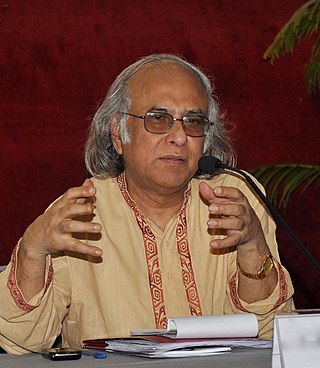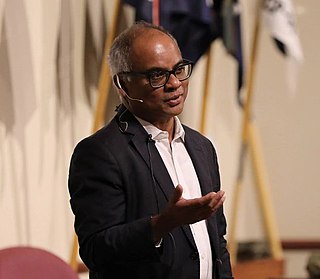Related Research Articles

The Bangladesh Armed Forces are the military forces of the People's Republic of Bangladesh. They consist of the three uniformed military services: the Bangladesh Army, the Bangladesh Navy and the Bangladesh Air Force. The Armed Forces are under the jurisdiction of Ministry of Defence of the Government of Bangladesh, and are directly administered by the Armed Forces Division of the Prime Minister's Office. The President of Bangladesh serves as the Commander-in-Chief of the Bangladesh Armed Forces. Bangladesh has the third-largest defence budget in South Asia, The Bangladeshi military is the 37th strongest in the world and the third most powerful military force in South Asia. Border Guard Bangladesh and Bangladesh Coast Guard are under the jurisdiction of the Ministry of Home Affairs. during peacetime, but during wartime they fall under the command of Bangladesh Army and Bangladesh Navy respectively.

Bangladesh Agricultural University, abbreviated as BAU, was established in 1961. It is the first agricultural university and also the second largest public university of Bangladesh. This university is located in Mymensingh. The university has 44 departments.
Ahmad Hassan Dani FRAS, SI, HI was a well known Pakistani archaeologist, historian, and linguist. He was among the foremost authorities on Central Asian and South Asian archaeology and history. He introduced archaeology as a discipline in higher education in Pakistan and Bangladesh. Throughout his career, Dani held various academic positions and international fellowships, apart from conducting archaeological excavations and research. He is particularly known for archaeological work on pre-Indus civilization and Gandhara sites in northern Pakistan.

The Bangla Academy is the official regulatory body of the Bengali language in Bangladesh. It is an autonomous institution funded by the Government of Bangladesh that fosters the Bengali language, literature and culture, works to develop and implement national language policy and conducts original research in Bengali. Established in 1955, it is located in the Burdwan House in Shahbagh, Dhaka, within the grounds of the University of Dhaka and Suhrawardy Udyan. The Bangla Academy hosts the annual Ekushey Book Fair.

Mohammad Abul Kashem is generally considered as a pioneer and the architect of the historic Language Movement of Bangladesh. He was also a politician, author and an eminent educationist. He founded the Islamic-oriented Bengali cultural organisation Tamaddun Majlish.

The Asiatic Society of Bangladesh is a non political and non profit research organisation registered under both Society Act of 1864 and NGO Affairs Bureau, Government of Bangladesh. The Asiatic Society of Bangladesh was established as the Asiatic Society of East Pakistan in Dhaka in 1952 by a number of Muslim leaders, and renamed in 1972. Ahmed Hasan Dani, a noted Muslim historian and archaeologist of Pakistan played an important role in founding this society. He was assisted by Muhammad Shahidullah, a Bengali linguist. The society is housed in Nimtali, walking distance from the Curzon Hall of Dhaka University, locality of Old Dhaka.

Chittagong Veterinary and Animal Sciences University (CVASU) is a public research university in Chittagong, Bangladesh. It is the only specialised veterinary university in Bangladesh. It is located at Khulshi, Chittagong. Generally, the public universities in Bangladesh offer degrees on department. Like every other agricultural university in Bangladesh, CVASU offers degrees on faculty.
Naiyyum Choudhury was a Bangladeshi biotechnologist and a nuclear scientist. He pioneered the development and adoption of the National Biotechnology policy of Bangladesh. He served as the Chairman of Bangladesh Atomic Energy Commission, and also served in many important positions in Bangladesh. He was serving as the founding Chairman of Bangladesh Atomic Energy Regulatory Authority (BAERA) at the time of his death. He was the Chairman of the Department of Microbiology, Dhaka University, Professor and Coordinator of Biotechnology at BRAC University, and served as faculty member in Jahangir Nagar University and BUET. He was also the IAEA Regional Cooperation Agreement (RCA) Chair person. He was also a fellow of Bangladesh Academy of Sciences (BAS), and was serving as the Vice President of BAS at the time of his death. He was also the contact person for Inter Academic Panel (IAP) of Bangladesh.
M. Afzal Hossain is a Bangladeshi academic and scientist in the field of agriculture and biochemistry. He has been serving as vice-chancellor of Hajee Mohammad Danesh Science & Technology University, Dinajpur, since September 2008. In 1998, he was awarded an invitation fellowship from Japan Society for the Promotion of Science (JSPS) to serve as a visiting professor at Hokkaido University, Japan.
M Anwar Hossain is a Bangladeshi scientist, writer, and politician. He is a professor at the Department of Biochemistry and Molecular Biology of University of Dhaka and a member of the Standing Committee of the Jatiya Samajtantrik Dal. He was the 14th vice chancellor of Jahangirnagar University and the former president of the Dhaka University Teachers' Association (DUTA) and Bangladesh Society of Biochemistry and Molecular Biology. Hossain was a freedom fighter of the Bangladesh Liberation War of 1971 during which he served as a staff officer of sector 11. Hossain has been detained and imprisoned twice by military rulers of Bangladesh and has been described by Senator Edward Kennedy as a 'prisoner of conscience'.

Kazi M. Badruddoza was a Bangladeshi agronomist who is credited with using Agricultural Genetics and Plant Pathology to extensively increase agricultural production in Bangladesh thus leading the nation toward self-sufficiency in staple cereal crops. He is known as the Father of Modern Agriculture in Bangladesh and the only National Emeritus Scientist of Bangladesh. He was one of the early leaders of the global team of the green revolution for his role in development of high yielding wheat, rice and maize varieties. For his work in Agricultural genetics, Badruddoza was awarded numerous honors, including the Independence Day award, the highest civilian award of Bangladesh. Prior to creation of Bangladesh as an independent state, he was also awarded the Tamgha-e-Imtiaz, a state organized civil award, in former West Pakistan, as well as the Tamgha-e-Pakistan. In addition, he is credited with the genetic engineering for the highly nutritious and large variety of guava, the Kazi Guava. In his honor, the genus of fungus, Kaziboletus. in the family Boletaceae, discovered in Bangladesh, was named after him.

Qazi Kholiquzzaman Ahmad is a Bangladeshi economist and development thinker and activist. He is currently the chairman of Dhaka School of Economics (DScE), a constituent institution of the University of Dhaka, devoted to post-graduate studies in economics and related subjects. He is former chairman of Palli Karma-Sahayak Foundation (PKSF), which is largest rural development funding, skill development and management support agency in Bangladesh. He received the highest national civilian award Independence Award 2019; and Ekushe Padak 2009, presented by the Government of Bangladesh.
Ahmad Shamsul Islam is a Bangladeshi scientist and educator. He was awarded Ekushey Padak in 1987 by the Government of Bangladesh for his contribution to education. He is serving as a Professor of the Department of Botany at the University of Dhaka.

Bangladesh Academy of Sciences (BAS) is an academic forum for Bangladeshi scientists and technologists. Established in 1973, it aims to fulfill the role of promoting research and development of sciences in Bangladesh.

Kamal Ahmad is a Bangladesh-born, now U.S. national, educator and social entrepreneur. He led the creation of the Asian University for Women located in Chittagong, Bangladesh in 2006.

The Government agencies in Bangladesh are state controlled organizations that act independently to carry out the policies of the Government of Bangladesh. The Government Ministries are relatively small and merely policy-making organizations, allowed to control agencies by policy decisions. Some of the work of the government is carried out through state enterprises or limited companies.
Qaisuddin was a Bangladeshi academic, researcher and chemist. He has served as the Vice Chancellor of two universities in Bangladesh, Islamic University, Bangladesh and Bangladesh Open University. He was the 5th Vice Chancellor of the Islamic University. He was a professor in the Department of Biochemistry, Rajshahi University. He was first academician of Bangladesh who act as vice-chancellor two university serially.
Muin-ud-din Ahmad Khan was a Bangladeshi historian, and professor of Islamic history and culture at the University of Chittagong. He served as the founder Vice-chancellor of Southern University Bangladesh and the first Director General of Islamic Foundation Bangladesh.

Niaz Ahmed Khan is a Bangladeshi academic, researcher, and development practitioner who is the 30th vice-chancellor of the University of Dhaka (DU). Prior to this, he served as the pro vice-chancellor of Independent University, Bangladesh and was a professor at the University of Dhaka and the University of Chittagong.
References
- 1 2 3 4 5 6 7 8 9 10 11 12 Hossain, Md. Anwar (5 July 2021). "Ahmad, Kamaluddin". Banglapedia . Retrieved 2024-09-19.
- ↑ "Home :: Dhaka University". www.du.ac.bd. Retrieved 2024-09-19.
- 1 2 3 4 5 6 7 8 9 10 11 12 13 14 15 "Fellow Details - Bangladesh Academy of Sciences". bas.org.bd. Retrieved 2024-09-19.